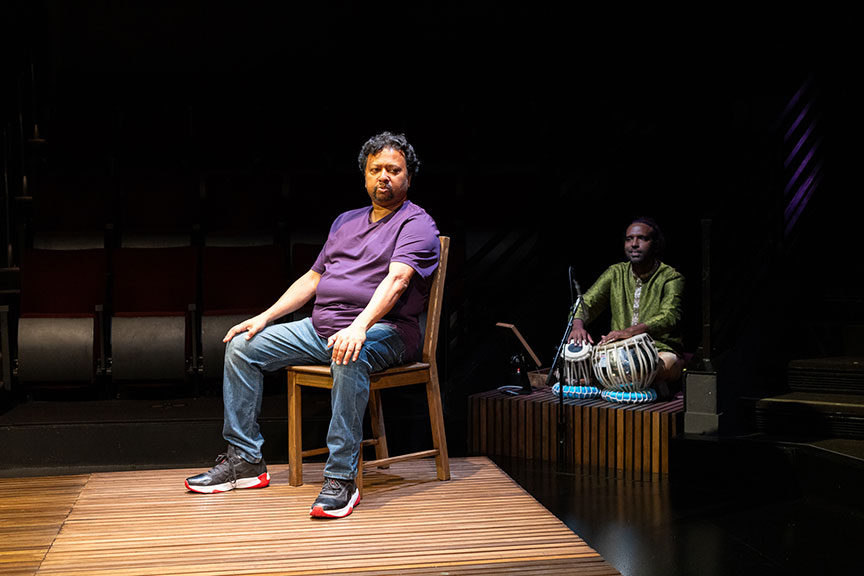|
Alaudin Ullah (left) and Avirodh Sharma in "Dishwasher Dreams." Photo by Rich Soublet II I wish that everyone who owns a MAGA cap could see a performance of Alaudin Ullah’s solo show “Dishwasher Dreams.” If plain facts can’t persuade them that there’s hard work, sacrifice and even tenderness in the immigrant experience, maybe this autobiographical story of Ullah and his Bengali family could.
There’s also great value in what Ullah has to share about being Muslim and about what ignorant people think Muslims are. OK, I acknowledge I’m getting all political here, but Ullah’s “Dishwasher Dreams,” directed by Chay Yew, is not a political piece. A onetime standup comic with “Comedy Central,” HBO and MTV credits to his name, Ullah utilizes humor and lots of it to tell the tales of his Bengali parents, his own experiences in his two homelands (Bangladesh and the United States) and a career that has taken him from the standup stage to theaters like the Old Globe’s Sheryl and Harvey White space where “Dishwasher Dreams” is in production. Ullah’s most strident commentary has to do with how Muslims are perceived, in particular by Hollywood. He re-creates near the end of the 100-minute show an audition he did for suits who wanted him to spout stereotypical (and offensive) “Muslim terrorists” dialogue. But the lion’s share of “Dishwasher Dreams” is comprised of Ullah’s breathless storytelling: about his dishwasher father’s life in Spanish Harlem; about his mother and the life she would go on to lead in America as well; about the “magic” of Yankee Stadium, how for a wide-eyed boy it became another “Mecca” with Reggie Jackson his adored idol; how a visit back home to Bangladesh as a boy forged a friendship that ultimately had a tragic ending. Accompanying Ullah, who under Yew’s direction flits from place to place on the White theater-in-the-round stage, is tabla musician Avirodh Sharma. (He also delightfully warms up the audience before the show starts.) Though Ullah’s delivery and cultural references are those you might anticipate from any seasoned standup performer, there is always the awareness of his heritage, of the fun he can have with it but the deep pride he falls about it. An early influence was George Carlin, who among other things showed Ullah that joking about religion can pay off. The legendary comedian who made famous “The Seven Words You Can Never Say on TV” was almost as big a hero to Ullah as was Mr. October, the Yankees’ indomitable Jackson. What surprised me about this show, especially after I’d interviewed Ullah for a San Diego Union-Tribune feature story and found him just hilarious, was how touching “Dishwasher Dreams” is. There are moments that catch in your throat, proving that when it comes to families so much is universal among nations, among peoples, among ethnicities. A hundred minutes is a lot for a one-person affair, but “Dishwasher Dreams” is a consistently compelling audience experience. “Dishwasher Dreams” runs through Oct. 15 in the Old Globe’s Sheryl and Harvey White Theatre in Balboa Park.
0 Comments
Leave a Reply. |
AuthorDavid L. Coddon is a Southern California theater critic. Archives
July 2024
Categories |
David Coddon |
|
